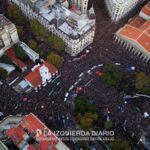
Columbia University expels dozens of students for pro-passage protests amid political pressure in the US
The University of Columbia, one of the most prestigious higher education institutions in the United States, has conflicted directly with its own student body after applying severe punishments to almost 80 students who participated in demonstrations in support of the Palestinians. Disciplinary measures include expulsions, suspensions ranging from one to three years and even the revocation of diplomas already granted.
The case has called national and international attention, not only because it involves a renowned university, but by placing in check the balance between freedom of expression and maintenance of the academic order in the midst of one of today’s most polarizing conflicts: the war between Israel and Hamas in Gaza.
Also read:
US tariff overthrows values in the Brazilian market
The Guardian defends Gaza in Editorial: ‘It will be necessary to stop genocide’
Brazil becomes a page and approaches China in the face of US tariff threat
According to information released by the University’s Judicial Council, the punishments were applied after the completion of the disciplinary hearings regarding two specific moments of student mobilization: the manifestation occurred at the Butler Library on May 7, 2025 and the camp called “Rafah Revolt”, held on May 31, 2024, during the traditional Week of Ex-Bowl Meeting Week.
“Columbia’s suspension for protesting against genocide is the greatest honor,” said Columbia University Apartheid Divest (Cuad), a coalition of student groups engaged in the Palestinian cause in a publication on social networks. “We reject that Columbia has any reputation that is worth keeping and categorically declare that we do not want to keep it,” the group added.
Protests that became global movement
The protests in Columbia did not happen in isolation. In 2024, pro-Palestinos students set up camps at various US university campuses, but it was in Manhattan that the movement gained the highest repercussion. The occupation of the Butler Library, one of the university’s main symbols, occurred during the final tests, generating tension and mobilizing media attention.
At the time, the New York police were called to dismantle the camp, resulting in the arrest of 78 people. Protesters claimed that the university was financially disconnected from companies with bonds to the Israeli Army, break business relations with the State of Israel and assume a public position of solidarity with the Palestinians in the face of the escalation of violence in Gaza.
According to the organizers, the protest in May was described as a “peaceful class” with readings and debates on the thought and the trajectory of Palestinian activist Basil al-Araj, killed by Israeli forces in 2017. Despite the reportedly educational nature of the event, the university considered that there was an interruption of academic activities and applied mass sanctions.
Political pressure and federal financing
The punishment wave does not occur in vacuum. Behind the scenes, there is strong pressure from the federal government, especially after the announcement of then -President Donald Trump that he would remain about $ 400 million in Columbia funding, on the grounds that the university would not have acted firmly against what he classified as “anti -Semitic activities” during protests.
The measure led the institution to negotiate with the government the refund of funding, which resulted in a series of concessions. Among them, the prohibition of the use of masks in campus demonstrations and the granting of special powers to 36 campus police officers to conduct student arrests.
The student newspaper Columbia Spectator It found that most punished students received a two -year suspension and that they were required to submit a formal apology to the university before they could return to academic activities.
Reaction and repercussion
The mass disciplinary action, described as the largest in the history of the university, caused immediate reactions of civil rights and students from other institutions. Many see punishment as part of a growing trend of repression of pro-Palestinian activism on US university campuses.
In a statement issued on Tuesday, Columbia University itself defended the measures taken. “Our institution must focus on fulfilling its academic mission to our community. And to create a prosperous academic community, there must be mutual respect and for the work, policies and fundamental rules of the institution,” the note said. “Interruptions in academic activities violate the policies and rules of the University, and such violations will necessarily generate consequences.”
The university did not disclose how many students were expelled, suspended, or had revoked diplomas, nor revealed the names of the punished, alleging protection to student privacy.
Despite the official justification, the episode rekindles the debate on the limits of freedom of expression in academic environments and the role of educational institutions in the face of external political pressures. While some defend the maintenance of order as a priority, others see in punishments a sign that student activism is being criminalized on behalf of a controversial agenda.
And the case of Columbia, far from ending the debate, promises to further feed the controversy surrounding freedom of expression, the role of universities in society and the limits of political activism within the campuses.
Columbia University students maintain resistance even in the face of expulsions and threats of deportation
While Columbia University announced the severe punishments applied to almost 80 students involved in pro-Palestinian protests, another chapter of the controversy gained strength in Washington. On the same Tuesday, Mahmoud Khalil, one of the most visible leaders of the university student movement, met with legislators in the US capital just over a month after being released from immigration custody in Louisiana.
Khalil, 30, and a permanent resident of the United States, continues to face the risk of deportation under the Trump government, which has been based on an obscure disposition of the 1952 immigration and nationality law to try to expel international students identified with the Palestinian cause. The attempt, according to immigration experts, represents an unprecedented instrumentation of the legal system for political purposes.
Given the sanctions announced by the university, the Columbia University Apartheid Divest Student Group (Cuad) responded with a blunt statement. “While the US and Israel hungry 2.1 million inhabitants of Gaza, Columbia has worked diligently with [o governo Trump] To suspend dozens of students for pro-Palestinian activism, ”the collective said in a statement.
The group pointed out that the punishments applied constitute the largest number of sanctions already recorded for a single political protest in the institution’s history, greatly surpassing the precedents for lectures or occupations of unresolved buildings to Palestine. “Students are still committed to ending Israeli genocide supported by the US and Colombia, regardless of the school’s sanctions,” he said.
Citing testimonials presented during the July disciplinary hearings, the students reiterated: “All universities in Gaza were destroyed. Hundreds of academics were killed. Books and archives were incinerated. Whole families were erased from the civil registration. This is not a war. The message was clear: “We will not be determined. We are committed to the struggle for Palestinian liberation.”
The government offensive against universities
The repression of university protests is not limited to academic sanctions. The Trump government has conducted a systematic offensive against higher education institutions, especially those considered “elite” as part of a broader strategy of combating what classifies as “leftist activism” and “anti -Semitism” on campuses.
Protests against war in Gaza, who spread to universities such as Columbia, Ucla and Harvard last year, were compared by analysts to the Vietnam anti-war era when student activism directly challenged the US foreign policy. Trump took the moment to portray protesters as part of a leftist and anti -Semitic revolt, using the episode to press educational institutions.
Administration argues that universities have failed to protect Jewish students from alleged episodes of harassment and violence during the demonstrations, citing incidents at camps and songs considered anti -Semitic. Since early 2025, the Department of Education’s civil rights office has been investigating more than 50 universities, including Columbia.
Punitive measures and threats to university autonomy
What started with investigations evolved into concrete measures. The government has frozen billions in federal scholarships for research and threatened to revoke the tax exemption status or even the accreditation of institutions that do not submit to federal requirements. Harvard, for example, saw billions of dollars in federal frank financing after refusing to allow his programs to be audited by alleged “ideological captures.”
The situation worsened when the government threatened to block the entry of international students into Harvard, alleging “national security” and high crime rates in the campus – a justification contested by experts. Given the measure, Harvard filed a lawsuit and obtained a temporary blockade from a federal judge to the order that prohibited foreign students.
These policies also reflect the general opposition of the Trump government to the so -called “liberal bias” perceived in higher education. Administration has as its specific target diversity, equity and inclusion (DEI) programs, accusing them of promoting division and “reverse discrimination”. For critics, the offensive represents an attempt to impose a conservative view on education, politics and social values.
While students maintain their resistance and backstage political backstage boil in Washington, the case of Columbia and other universities reveals a delicate moment for the autonomy of higher education institutions in the United States. And, it seems, the battle for the future of academic freedom is just beginning.
With information from Al Jazeera*
Source: https://www.ocafezinho.com/2025/07/24/quando-o-ativismo-vira-crime-no-ambiente-academico-dos-eua/

